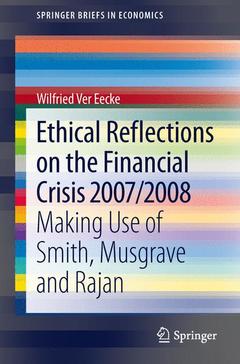Description
Ethical Reflections on the Financial Crisis 2007/2008, 2013
Making Use of Smith, Musgrave and Rajan
SpringerBriefs in Economics Series
Author: Ver Eecke Wilfried
Language: English
Subjects for Ethical Reflections on the Financial Crisis 2007/2008:
102 p. · 15.5x23.5 cm · Paperback
Description
/li>Contents
/li>Biography
/li>Comment
/li>
Provides ethical arguments for the necessary role of the government for a well-functioning economy
Generalizes the applicability of Musgrave’s concept of merit goods by connecting this concept to the neo-liberal economic philosophy
Provides a Kantian argument to connect individual freedom with government regulation, oversight and intervention?
Includes supplementary material: sn.pub/extras




